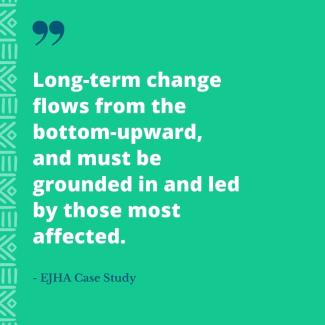EJHA Case Study
BEA is pleased to share our latest grassroots case study of Environmental Justice Health Alliance for Chemical Policy Reform (EJHA). EJHA is a national network of grassroots and advocacy environmental justice organizations located across the country that are built on the history of environmental and economic justice. EJHA’s approach places the most impacted communities at the center of leadership and strategies, engaging diverse allies and experts as partners by building equitable relationships that are accountable to grassroots priorities.
View the full case study here: A Living History: The Environmental Justice Health Alliance for Chemical Policy Reform
All of EJHA’s activities build grassroots power and capacity while working toward solutions that will bring about environmental justice (EJ). EJHA’s current foci are Safe and Healthy Communities (reducing toxic emissions and preventing chemical disasters); Clean and Safe Water (protecting drinking water from chemical contamination); and Non-Toxic Dollar Stores (transforming these chains from retailers of toxic products to sources of safer products and healthy foods). EJHA represents one of the few national EJ collaborations fully grounded in and accountable to EJ communities, as well as actively engaged in national campaigns that are successfully impacting national, state, and local policies, and corporate practices.
This case study provides ideas, advice, and resources for moving toward this new EJ paradigm. Included here are a range of practical tools, strategies and background information. We hope that the approaches offered here move us closer to a unified, effective framework for and with the movement. A framework that allows individuals and organizations to work together in ways that not only serve their own missions, but also the broader goal of establishing a durable majority of people at the grassroots who understand and can be mobilized on behalf of environmental and economic justice.

